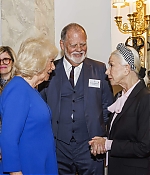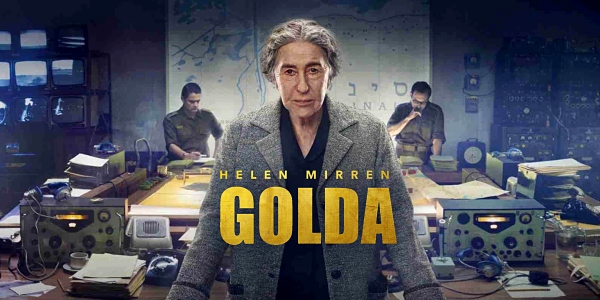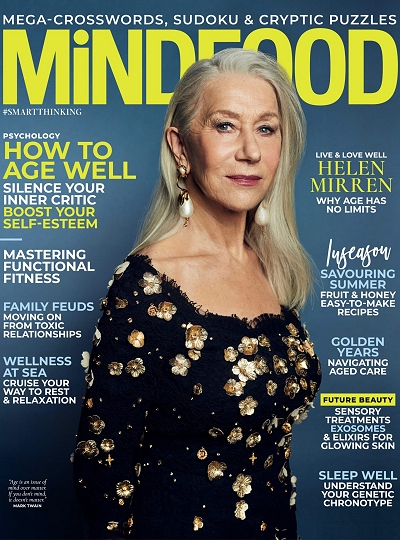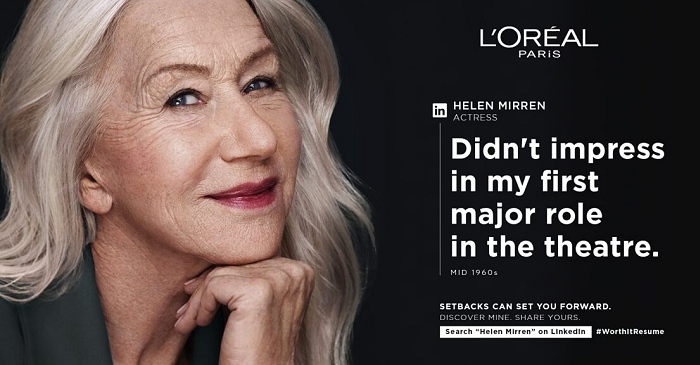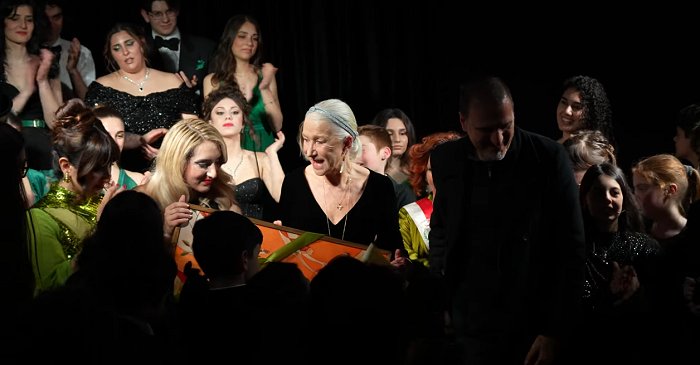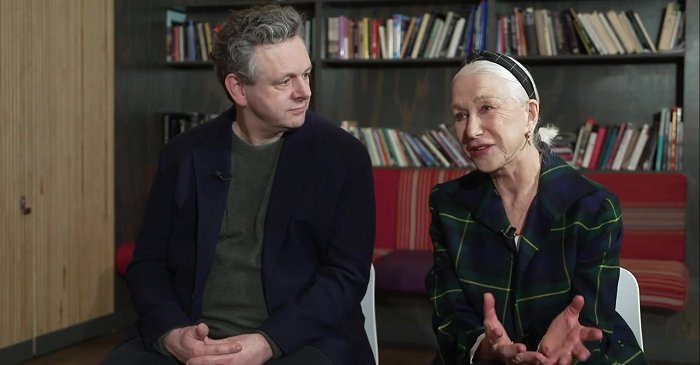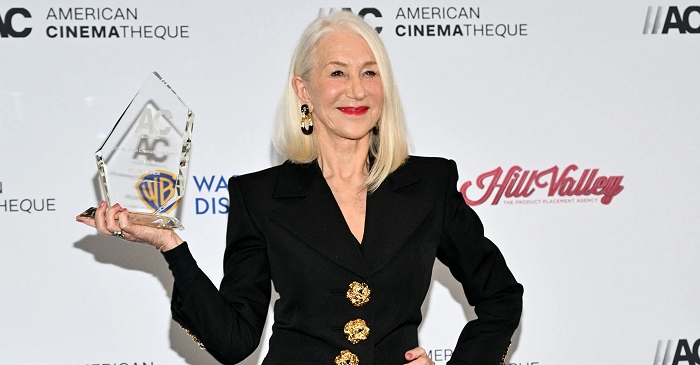
|
Welcome to The Helen Mirren Archives, your premiere web resource on the British actress. Best known for her performances with the Royal Shakespeare Company, "Prime
Suspect" and her Oscar-winning role in "The Queen", Helen Mirren is one of the world's most eminent actors today. This unofficial fansite provides you with all latest
news, photos and videos on her past and present projects. Enjoy your stay.
|
Celebrating
10 years
on the web
|
The Oscar-winning actress discusses her Russian roots, her Oscar-winning role as the Queen, why she never had children and her latest brace of movies
I learned quite early on in life,” Helen Mirren is telling me over tea at the Dorchester hotel, “that we are all two people. And one of those people none of us will ever know. You, Tim, for example, will never know how I perceive you. What my ideas are about the way you are sitting and your hair or your cheeks or whatever. You will never know.”
It’s true. And, I have to confess, sitting there, suddenly aware of my hair – of my cheeks? – I’m quite happy to keep it that way. Mirren is frank and warm as an interviewee but you do have the sense, all the time you are posing your artless little list of questions, that she effortlessly sees right through you. The actress gives the constant impression of quite severe self-knowledge but also a withering understanding of human motivation in more general terms. After a lifetime of enduring the male gaze, for better and worse, there is not much she doesn’t know about looking.
“Acting,” she goes on, “is a great deal to do with accepting that other person and coming to terms with her. You can’t control how other people see you or think of you. But you have to be comfortable with that.”
The previous night, I had found myself watching the compulsive YouTube clip of Mirren being interviewed by Michael Parkinson in 1975. If you had to provide a single piece of footage that conveyed the idea of sexual politics in the 70s, then that interview achieves in seven minutes what it took a whole series of Life on Mars to dramatise. Parkinson introduces Mirren as “sluttishly erotic”. He kicks off by asking: “You are, in quotes, a ‘serious actress’; do you find what might best be described as your equipment hinders you in that pursuit?” Mirren, then 30, and the leading lady of the RSC, toys with a long feather she has bought with her on to the set and, at a stroke, makes Parky look the leering schoolboy. “How dare you?” she murmurs. And then: “Describe in detail what you mean by my equipment.”
In person, Mirren offers only glimpses of the power she can draw to herself on screen. Sitting quietly at the Dorchester, with her ankles demurely crossed, she seems both her age – 66 – and dramatically not her age. I wonder what she makes now of that former self on Parky?
“I watched it recently on the internet,” she says. “I didn’t know it was there. And actually I was really proud of myself. It was the first chat-showy thing I had done. I was incredibly nervous. I was holding that feather. And I have to say I thought I handled it well. I was always an instinctive feminist, without being overly political, just in my feelings about myself. Parkinson, of course, just didn’t get it at all.”
She seemed, I say, properly angry about the type in which she was cast. Was that her normal state at the time?
“You didn’t encounter that sexism so much in the theatre,” she says, “but it was a norm of everyday life. I was insulted. But I was also my own worst enemy to a certain extent. I was into girlie things and also what I would call eroticism as art; I had a relationship with a photographer [James Wedge] and explored that. I never saw a conflict in those things. Your personal dignity seems a separate thing from that to me. And it is a question of taste. To this day, I still can’t quite explain why one thing is vulgar and one thing is not, but I know for sure which is which.”
Mirren was famous early in her film career for her apparently relaxed attitude to nudity. That defining “other self” has stayed with her, somewhat to her amusement. Her “equipment”, as Parky had it, still has a life of its own, at least in some eyes. Key “Helen Mirren” into Google and the predicted searches come up with “Helen Mirren bikini”, “Helen Mirren Hot”, “Helen Mirren best body” and “Helen Mirren tattoo”. Few actresses have ever commanded her mix of allure and aloof for so long. She knows her way round every aspect of that appeal and uses all of it to her advantage on screen and on stage. As Stephen Frears remarked when casting her as the Queen: “It seemed essential to have someone who made you nervous…”
Talking further of how self-knowledge is only one small part of who we are, Mirren suggests she remains intrigued by how her filmed self rarely feels like her at all. She can only really watch her movies “when they are seven or 10 years old” she says, because the disjunction between her own perception and the magnified film version is by then less shocking. “If I catch a glimpse of myself in Age of Consent, with James Mason, the first film I did, it is a bit, ‘Wow! Who is that funny little hairy fat girl?’ It is a different person. Every cell in your body is different. It’s not really you at all.”
One way of reading Mirren’s stellar career is as a determined and brilliant progression toward a different kind of nudity. Though her body still has its admirers, her emotional honesty has long since eclipsed it. She bared all as Jane Tennison in the seven series of Prime Suspect, without ever removing a stitch. As the Queen, her tweeds only served to highlight the remarkably candid exposure of the person within.
Two forthcoming films will peel away further layers. The Debt, an enormously watchable thriller directed by John Madden (Shakespeare in Love), casts her as a Mossad agent who is forced to confront the realities of her past as a Nazi hunter. In The Door, based on the brilliant novel by Magda Szabó, she plays a Hungarian housekeeper who takes over the life of a female writer.
The Debt has already opened in the States to excited reviews. Mirren had worked with Madden before on series 4 of Prime Suspect and she relished the prospect of doing so again. “Structurally,” she says, “the film was a hard thing to pull off. But John is rather like Hitchcock in that you are aware that he has every rhythm and timing and tone constructed in his mind for every scene before he starts shooting.”
The Debt is a reworking of an Israeli film, which Mirren decided to see after she took the role. “I watched in trepidation because you really want to come to something fresh and free. But I was glad I saw it because it taught me the amount of feeling that the character has to inhabit. The role was so full of import and passion and seriousness. You couldn’t be British about it, cool or ironic; it had to be a different kind of emotional register.”
Mirren’s younger self in the film is played, beautifully, by Jessica Chastain, the current woman to watch in Hollywood. The film loops between their two time frames. Chastain is the young Mossad officer in cold war Berlin who is part of a group sent to capture a former concentration camp torturer now working as a gynaecologist.
The kidnap operation subsequently becomes a heroic legend in Israel, but as the film unfolds, and becomes more rooted in Mirren’s story, we come to realise that the history is not all to be trusted. Mirren says she hardly overlapped with Chastain on set, but “in a sense she created the character which I could then surf on”. The younger actress had, she says, done a lot of work studying her own mannerisms, so the transition between the two seems more seamless. “She was good at pointing out things about me of which I was completely unaware,” Mirren says. “And I was never as beautiful as she is now. So I lucked out on that level, too.”
The film culminates in an extraordinary fight scene between Mirren and her nemesis in an old people’s home, which took two days to film. Mirren keeps coming back for more, though she is characteristically modest about the scene: “I call it the geriatric fight,” she says. “We were both struggling to get up off the floor as much as anything…”
That conclusion of the film takes place in Russia, and sees Mirren speaking in Russian, which makes it a return to roots of sorts. Her grandfather, a senior officer in the Tsarist army, became a reluctant emigre to England after being stranded in London during the Revolution, while on a mission to buy arms. He subsequently lived with Mirren’s family in Leigh-on-Sea in Essex until his death in 1955, telling Tolstoyan stories of the family estate and the lives they had lost. As a young girl, Helen was called Ilyena, but once her grandfather had passed away her father anglicised their names. The Mironoffs became the Mirrens. Does she feel, as she gets older, and in her choice of roles, I wonder, a sense that her Russian roots are reasserting themselves?
She suggests that she does, in a way. “Working on these two films – The Debt and The Door – it is certainly worth remarking on,” she says. “In one sense, it is terrifying. For The Door, the costume people came to see me while I was in Venice at the film festival. I was in this gorgeous palatial room and they arrived with all these Hungarian peasant clothes. I put them on and looked in the mirror and thought I just looked so completely right. I mean, it was terrifyingly believable: me as an eastern European peasant woman. My roots just came blasting through.”
Does she feel anything like that Russian-ness inside?
“It’s hard to extricate what’s what inside you,” she says. “My father very much wanted to assimilate. He wanted a British family and not to live in the past as his father had done. But however hard he tried, my father was Russian in his heart. He spoke Russian but he didn’t want to. And he certainly didn’t want us to. He was a socialist.”
Does she still have family in Russia?
It’s odd, she says, but until a few years ago that world was quite closed to her. “I didn’t think I had anyone over there. But then I had this series of Who Do You Think You Are? type moments.”
Mirren had always kept a stash of letters given to her by her grandfather, which were written by his six sisters who had stayed behind in Russia after the Revolution. When she was working on one of the last episodes of Prime Suspect, there was a Russian actor in the cast and a translator on set. She brought the letters in for him to look at, along with an incomplete memoir that her grandfather had written.
“I discovered where my grandmother was buried and the names of my great aunts and so forth. Subsequently, I went on a British Council thing out to Russia and I visited the cemetery where my great grandmother was buried. Which was extremely poignant. After that was reported, a research journalist who lived in Moscow heard the story and found all our old estates that we had lost and still living members of the family. Mironoffs.”
The awareness of this past changed her sense of where she had come from, to a degree. And maybe helped her understand her acting a little more. Though she was a convent school girl, Mirren suggests that she has always had “a bit of propensity to the grand and operatic kind of emotion. I loved doing Phèdre [at the National theatre, two years ago], for example, and the Tolstoy piece I did [the film, The Last Station], where you can really let yourself go into these bigger emotions.”
It is probably in part that divide – between a certain kind of British coolness and a grander hinterland of tragic possibility – that gives Mirren’s screen presence its particular charge. She can seem both open and shut at one and the same time. When she first auditioned for the RSC, Trevor Nunn called her “his Russian princess”. Perhaps in some deep seated reference to her great-grandmother, the Russian countess, she always joked about having a thing for playing royalty. “I don’t mind if I don’t have any lines as long as I get to wear a crown,” she once observed. She has played Cleopatra three times. Her halcyon period in this respect were the years 2005 and 2006 when she played both Elizabeth I (in an Emmy-winning TV series) and Elizabeth II in Frears’s film.
In interviews at the time, Mirren wondered if her work might be done, at that point, as if things might not get any better. But, looking back, the Oscar for her performance as the Queen proved a further liberation for her. As a younger actress, like most great talents, she had a reputation as an intensely competitive force, wanting leads when finding herself in peripheral roles (“Like a racehorse being asked to pull the cart,” as she once put it). There is, she says, a lot less of that now. “Though I think that drive – ‘Why am I stuck doing this? Why aren’t I doing that?’ – never goes away. All that ‘What on earth am I doing with my life?’ is a constant.”
The Academy Award at least served to make those internal voices less insistent. “In the full knowledge that awards mean nothing, winning the Oscar for The Queen was fabulous in that I felt I didn’t have to worry any more,” she explains. “All those ungenerous feelings – ‘Why did she get it and not me?’ – just disappeared overnight. It’s horrible and unpleasant and disturbing, all of that, but it doesn’t stop you feeling it. I feel very much I can now do exactly what I want.”
That in itself is not an exact science and, contrary to popular imagination, “offers never flood in. People think I sit there and there is a proposal from Tarantino and a script to star opposite Robert Redford. Good scripts remain incredibly rare, though, and often I’m too old or just occasionally too young.”
The roles she has chosen to take on fulfil her long-stated ambition “to be prepared to age on screen”. For The Door, she wore no make-up at all, a fact the ever-generous Daily Mail found quite sensational when it ran pictures of her from the set, suggesting, bizarrely, that it was a nakedness too far.
She laughs at the thought. “It is actually incredibly rare on film to have nothing on your face at all,” she says. “Even when you are playing a character who wears no make-up, you wear make-up otherwise your eyes tend to disappear and look like two piss-holes in the snow. But on this occasion I really did wear no make-up. It was great because I could just prance in five minutes before I was due on. And also, once you let go of that, it’s gone. You just look the way you look.”
Mirren, in this great lateish period as an actress, seems able to find new ways of challenging herself and bringing herself up against the edge of what she knows. When she doesn’t get something instinctively, she does her research, she suggests. For The Queen, she studied as many portraits as she could find – artist’s impressions were closer to what she wanted than filmed footage. For The Debt, she immersed herself in Holocaust literature. Though she has often played mothers, as in these two films, it is one role that she has not known in life (though she has strong relationships with her husband Taylor Hackford’s two grown-up sons).
She has always been frank about not having maternal feelings: is it, I wonder, an aspect of human experience she finds hard to imagine?
She says not. “It’s not that I don’t love children. They are funny, and I just love them, but I never wanted to have them. I really tried to want it at one point… I thought maybe I should. But I never convinced myself.”
I guess she was – as “an instinctive feminist” – also firmly of the first generation where it was fine to acknowledge that fact?
“I guess so and I think still it is very fine not to want children. There are far too many people in the world. It is my contribution to ecology.”
Would she say her career was more important to her?
“No, not at all. I think some men and women just don’t have a deep urge to procreate. It’s funny, I was watching this programme on TV last night, Two Greedy Italians, and one of them announced: ‘The most important things in life are food and procreation.’ Well for me, neither of those things is centrally important.”
The things that are, she gives you to understand, just as she eventually gave Parky to understand all those years ago, are personal freedom and a sense of creative adventure. She married Hackford (director of An Officer and a Gentleman and Ray) at the age of 52, but neither of them has subsequently compromised their working commitments. Looking back, does she feel that her determinedly unplanned life established a narrative after all?
“You write your life story by the choices you make,” she says. “You never know if they have been a mistake. Those moments of decision are so difficult. I went through a phase of consulting the I Ching, which was useful in that it freed you up to listen to your instinct. Though often it would say things such as, ‘The water will pour down from the mountain and the sea will churn’ and you had to make of it what you wanted to.”
If there is a pattern to what she has done, however, she believes it lies in the fact that she has constantly been prepared to “throw things up in the air and see where they landed. I still have a Gypsy sense of adventure,” she insists. “I don’t think I have slept in the same bed for more than three or four months my whole life. I am always planting vegetables that I never get to eat and flowers that I never see flower. I have always moved around the world.”
She and Hackford divide their time between an estate in the hills above LA and a riverside place in Wapping on the Thames. They also have homes in New York and Provence. Mirren’s restlessness is creative as much as physical, though; her heroes tend to be painters, not actors. And she is inspired by the liberation that comes after the constraining perfectionism of youth.
“What I have learned is that you come more to accept that you are never going to get it right,” she says with a smile before she goes. “For any kind of artist, your whole life is a struggle to be free in your artform. I know now that you never get there. But you do get as close as you can.”

